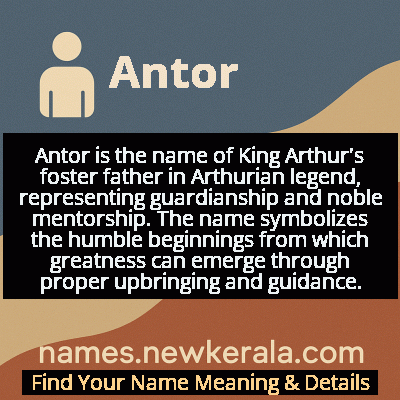Antor Name Meaning & Details
Origin, Popularity, Numerology Analysis & Name Meaning of Antor
Discover the origin, meaning, and cultural significance of the name ANTOR. Delve into its historical roots and explore the lasting impact it has had on communities and traditions.
Name
Antor
Gender
Male
Origin
Arthurian
Lucky Number
5
Meaning of the Name - Antor
Antor is the name of King Arthur's foster father in Arthurian legend, representing guardianship and noble mentorship. The name symbolizes the humble beginnings from which greatness can emerge through proper upbringing and guidance.
Antor - Complete Numerology Analysis
Your Numerology Number
Based on Pythagorean Numerology System
Ruling Planet
Mercury
Positive Nature
Adventurous, dynamic, curious, and social.
Negative Traits
Restless, impatient, inconsistent, prone to indulgence.
Lucky Colours
Green, white.
Lucky Days
Wednesday.
Lucky Stones
Emerald.
Harmony Numbers
1, 3, 9.
Best Suited Professions
Sales, marketing, travel, entertainment.
What People Like About You
Versatility, charisma, adventurous spirit.
Famous People Named Antor
Sir Antor
Knight of the Round Table
Foster father and mentor to King Arthur, raising him from infancy
Antor of Cornwall
Nobleman
Trusted guardian appointed by Merlin to protect the future king
Lord Antor
Royal Guardian
Key figure in Arthur's early development and knightly training
Name Variations & International Equivalents
Click on blue names to explore their detailed meanings. Gray names with will be available soon.
Cultural & Historical Significance
Beyond his narrative role, Antor symbolizes the medieval ideal of the faithful vassal and wise elder—the figure who prepares the next generation for leadership while remaining loyal to established hierarchies. His acceptance of Arthur's kingship despite having raised him as his own son demonstrates the Arthurian value of destiny over personal attachment. The character has influenced Western concepts of mentorship and foster parenting, representing the idea that true guardianship involves preparing children for their own destinies rather than molding them in one's own image.
Extended Personality Analysis
Antor is typically characterized as wise, loyal, and deeply principled—a man of steadfast integrity who prioritizes duty and honor above personal ambition. As Arthur's foster father, he demonstrates exceptional patience, nurturing qualities, and a strong sense of responsibility, raising the future king with equal measures of affection and discipline. His personality reflects the ideal medieval guardian: firm yet compassionate, humble yet authoritative, and always guided by a profound moral compass that values justice, loyalty, and proper conduct above all else.
This complex personality combines the sternness of a military trainer with the warmth of a devoted parent. Antor possesses the rare quality of selfless devotion, accepting Arthur's royal destiny without jealousy or resentment, instead taking genuine pride in having prepared him for greatness. His emotional maturity allows him to transition seamlessly from father-figure to loyal subject, demonstrating remarkable adaptability and emotional intelligence. This combination of paternal warmth and knightly discipline, coupled with his unwavering commitment to doing what is right rather than what is easy, makes him one of the most respected and psychologically complex secondary figures in Arthurian literature.
Modern Usage & Popularity
In contemporary times, Antor remains a rare but meaningful name choice, primarily used by enthusiasts of Arthurian literature and medieval history. The name sees occasional usage in English-speaking countries, particularly among families with interest in Celtic or Arthurian traditions, though it never appears on mainstream baby name charts. Its modern appeal lies in its distinctive sound and rich literary associations, offering parents a unique alternative to more common Arthurian names like Arthur or Lancelot. The name's rarity ensures distinctiveness while its noble associations provide cultural depth, making it particularly attractive to parents seeking names with historical significance but contemporary uniqueness. Current usage trends show it appearing occasionally in fantasy literature and gaming communities, where Arthurian themes remain popular.
Symbolic & Spiritual Meanings
Antor symbolizes the archetype of the wise guardian and selfless mentor—the figure who nurtures greatness in others without seeking recognition for himself. The name represents hidden nobility and the profound truth that destiny often emerges from humble beginnings, carefully cultivated by those who may never share in the glory. Symbolically, Antor embodies the transition from ordinary to extraordinary, serving as the essential bridge between Arthur's unknown childhood and his destined kingship, representing the crucial role that upbringing and mentorship play in the development of leadership. He stands as a testament to the idea that true guardianship involves preparing others for their own paths rather than keeping them dependent, and that the greatest service often comes from those who work in the background rather than the spotlight.

